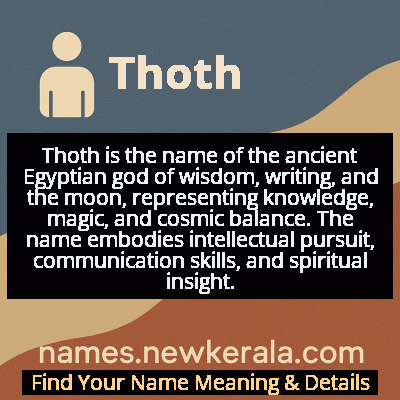Thoth Name Meaning & Details
Origin, Popularity, Numerology Analysis & Name Meaning of Thoth
Discover the origin, meaning, and cultural significance of the name THOTH. Delve into its historical roots and explore the lasting impact it has had on communities and traditions.
Name
Thoth
Gender
Male
Origin
Egyptian
Lucky Number
8
Meaning of the Name - Thoth
Thoth is the name of the ancient Egyptian god of wisdom, writing, and the moon, representing knowledge, magic, and cosmic balance. The name embodies intellectual pursuit, communication skills, and spiritual insight.
Thoth - Complete Numerology Analysis
Your Numerology Number
Based on Pythagorean Numerology System
Ruling Planet
Saturn
Positive Nature
Ambitious, efficient, realistic, and authoritative.
Negative Traits
Materialistic, stressed, confrontational, and can be overly ambitious.
Lucky Colours
Dark blue, black.
Lucky Days
Saturday.
Lucky Stones
Blue sapphire, amethyst.
Harmony Numbers
2, 4, 6.
Best Suited Professions
Business leaders, managers, financial services, law enforcement.
What People Like About You
Leadership, determination, organizational skills.
Famous People Named Thoth
Thoth (Mythological)
Egyptian God
Invented writing, mathematics, science and served as divine scribe
Thutmose III
Pharaoh
Built Egyptian empire and commissioned temples honoring Thoth
Thothmes
High Priest
Preserved sacred texts and oversaw Thoth's temple complexes
Name Variations & International Equivalents
Click on blue names to explore their detailed meanings. Gray names with will be available soon.
Cultural & Historical Significance
Extended Personality Analysis
Those named Thoth typically embody characteristics of profound intellect, wisdom, and analytical thinking, reflecting the deity's domains of knowledge and cosmic order. They often display exceptional communication skills, with a natural talent for writing, teaching, and explaining complex concepts clearly. Their personality tends toward contemplation and study, with deep curiosity about the world's mysteries and a methodical approach to problem-solving. The lunar aspect of Thoth suggests emotional depth, intuition, and an understanding of life's cyclical nature, making them adaptable yet principled individuals. They frequently serve as mediators or advisors, possessing the ability to see multiple perspectives and find balanced solutions to conflicts. While they may appear reserved or scholarly, they carry a strong sense of ethics and justice, often championing truth and knowledge as fundamental values. Their combination of intellectual rigor and spiritual insight makes them natural seekers who value both practical knowledge and deeper philosophical understanding.
Modern Usage & Popularity
In contemporary naming practices, Thoth remains a rare but meaningful choice, primarily used by parents with interests in Egyptian mythology, esoteric traditions, or those seeking unique names with deep cultural resonance. While not appearing on mainstream baby name charts, it maintains a consistent presence in alternative and spiritual communities, particularly among practitioners of modern pagan, Kemetic reconstructionist, and Afrocentric traditions. The name has gained some visibility through popular culture, including fantasy literature, video games, and television series that feature Egyptian mythology. Its usage reflects a growing appreciation for ancient wisdom traditions and a desire to connect children with historical cultural heritage. Parents choosing this name often value its associations with intelligence, wisdom, and spiritual depth, seeing it as a distinctive alternative to more common classical names while carrying profound mythological significance.
Symbolic & Spiritual Meanings
Thoth symbolizes the eternal human quest for knowledge, the transformative power of language and communication, and the delicate balance between opposing forces in the universe. As the divine scribe, he represents how writing and record-keeping enable civilization to preserve wisdom across generations and advance human understanding. His lunar associations connect him to intuition, cycles of time, and the reflective nature of consciousness, while his role in judgment ceremonies makes him a symbol of moral accountability and cosmic justice. The ibis-headed deity embodies the integration of celestial wisdom with practical knowledge, serving as a bridge between human intellect and divine understanding. In contemporary symbolic interpretation, Thoth represents the archetype of the eternal student, the wise counselor who mediates conflicts through superior knowledge, and the guardian of sacred traditions that connect humanity to higher truths. His symbolism extends to modern concepts of information technology, education systems, and the ethical responsibilities that accompany advanced knowledge.

